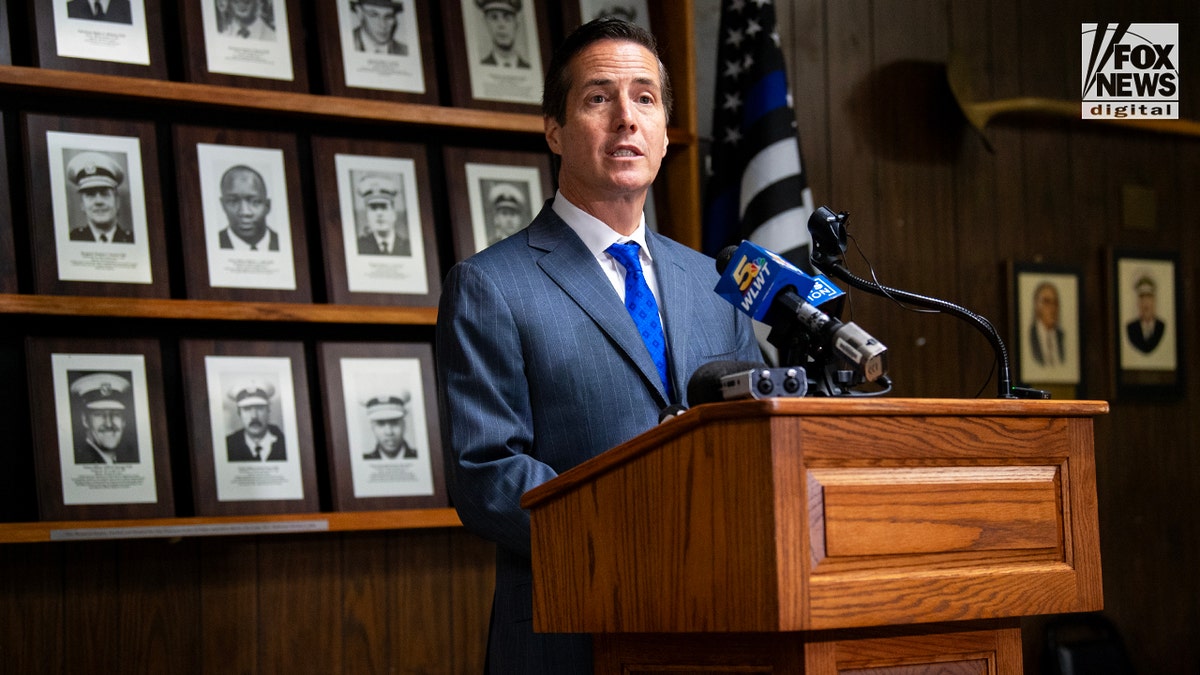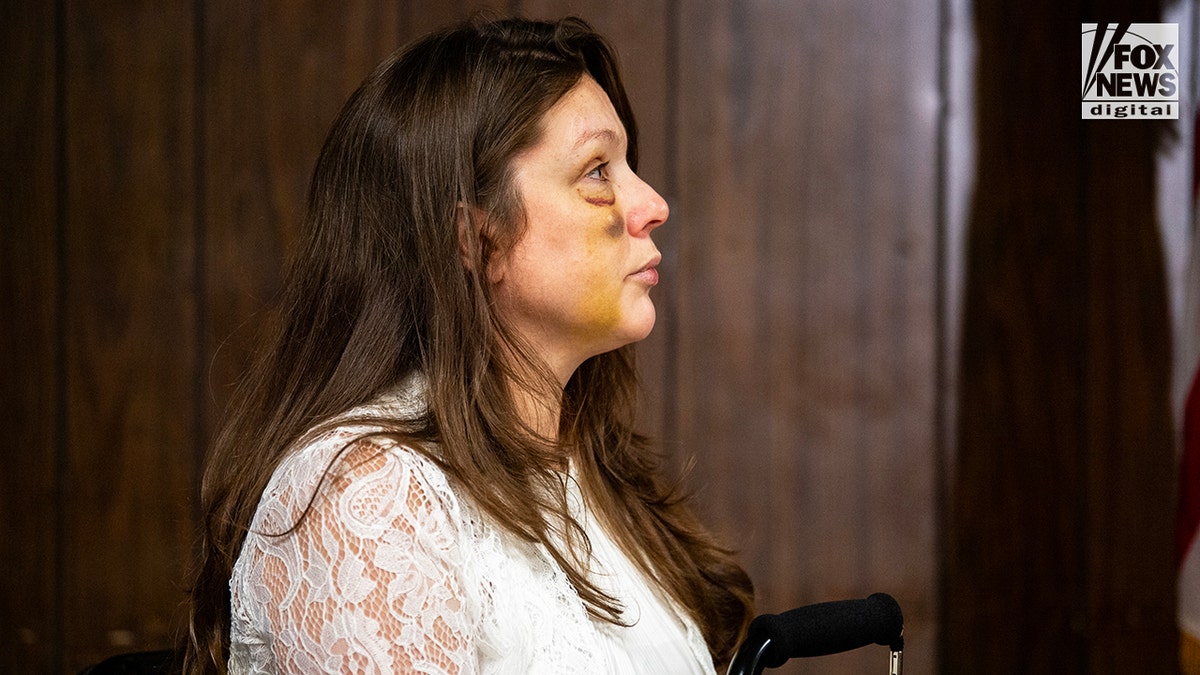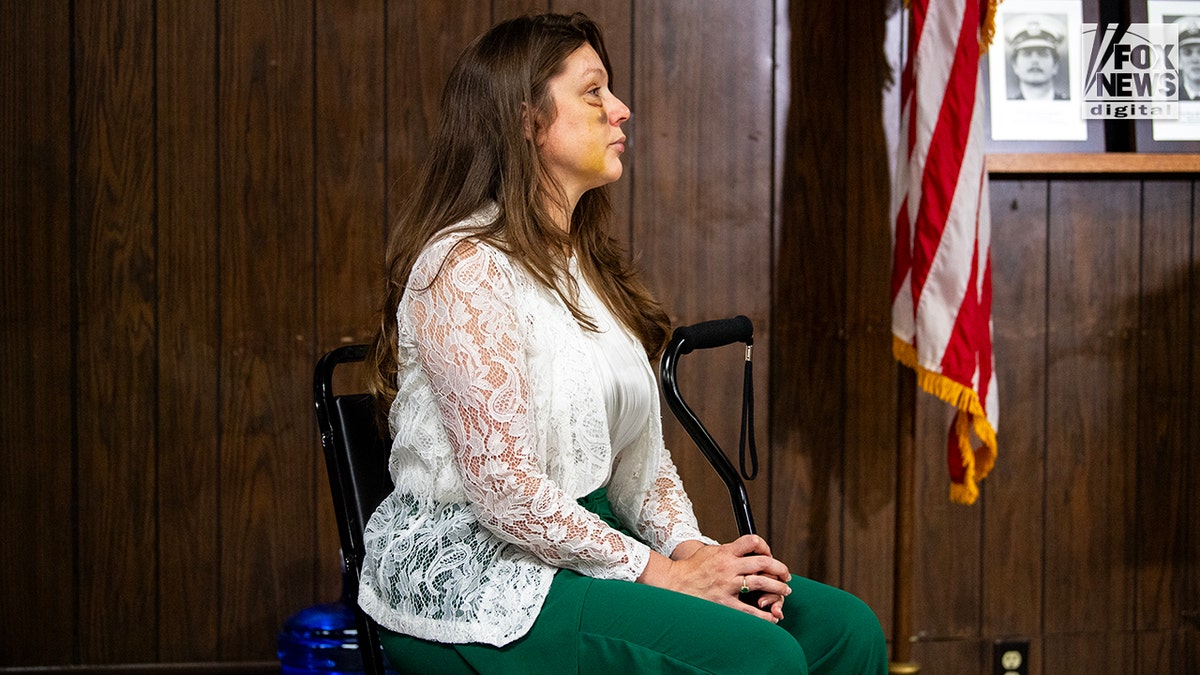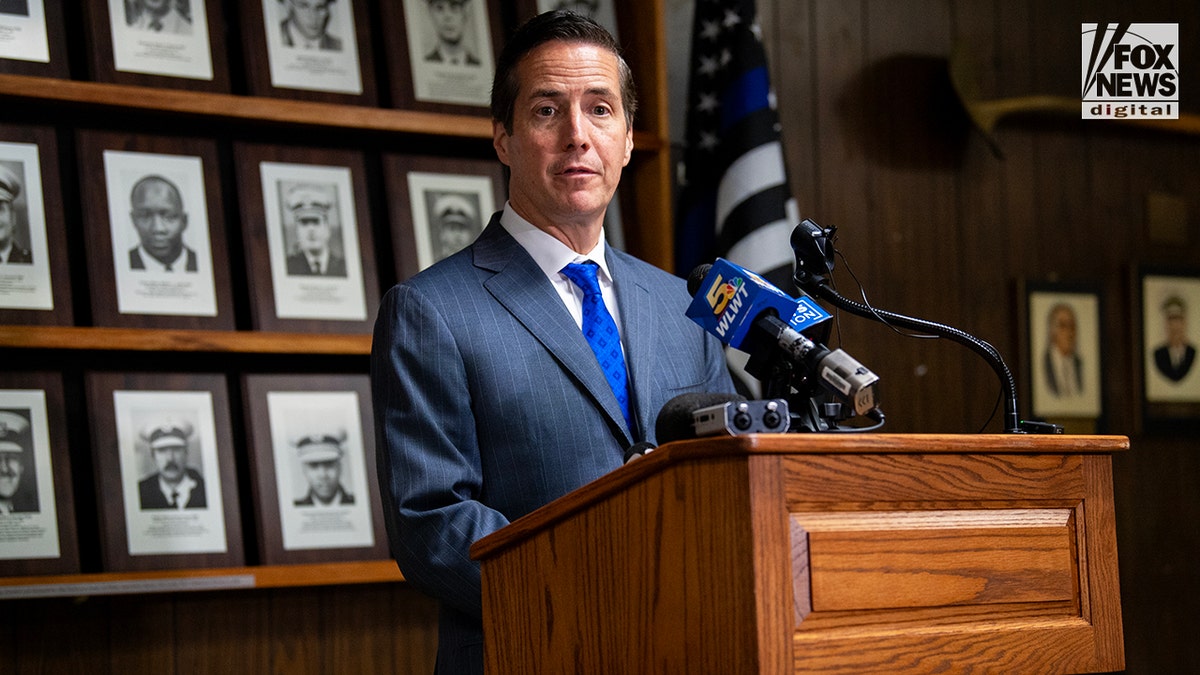INTERNACIONAL
Ohio senator introduces ‘Holly’s Act’ for woman brutally beaten in viral Cincinnati attack

NEWYou can now listen to Fox News articles!
Sen. Bernie Moreno, R-Ohio, is introducing «Holly’s Act» after a woman was violently attacked by a mob in Cincinnati late last month – a move aimed at ending what he calls the justice system’s revolving door for repeat offenders.
The attack happened around 3 a.m. on July 26 at the intersection of Fourth and Elm streets in Cincinnati’s central business district.
Bystander video captured the moment a large group turned on several individuals early that morning, and in one video obtained by Fox News Digital, an unidentified man could be heard yelling racial slurs while being beaten in the street. Other footage appears to show the male victim striking a member of the group shortly before the altercation escalated.
In another video, a woman later identified only as «Holly» tried to intervene before she was slammed to the ground and knocked unconscious.
EXCLUSIVE: RAMASWAMY DECRIES ‘ANTI-LAW ENFORCEMENT CULTURE’ IN WAKE OF BRUTAL CINCINNATI BEATING
New video of the viral Cincinnati beating shows individuals yelling racial slurs as the violence unfolds. (Jay Black)
A single 911 call came several minutes after the incident, despite more than 100 people standing by, recording, or participating in the melee.
Moreno held a press conference in Cincinnati on Wednesday after meeting with city officials, the FBI special agent in charge, the future U.S. attorney, police chief and a deputy from the local sheriff’s department.
Moreno described the meeting as starting «a little rough,» but said it ended productively.
Ultimately, he said everyone at the table agreed to work together to make certain that what happened on July 26 never happens again. He also said he wants to make sure anyone who lives in Ohio can visit any of the state’s cities.
CINCINNATI VIRAL BEATING VICTIM FORCED INTO ‘SUPER-SECRET SPOT’ WITH SECURITY

Sen. Bernie Moreno speaks at a press conference alongside Holly, a victim in the viral July 26 beating in Cincinnati, at the Fraternal Order of Police headquarters in Ohio on Wednesday, Aug. 6, 2025. (Julia Bonavita/Fox News Digital)
«We’re going to talk to some of our state legislators to see if we can put something in place that I call — with her permission — ‘Holly’s Act,’ which is how we raise the bar on minimum sentences, minimum bail requirements… We’re going to end the revolving door of injustice,» Moreno said.
«Our judges can no longer hide behind their cloak, and they have to be held accountable for not upholding law and order,» he added.
Law enforcement officials risk their lives every day to arrest criminals, which involves going out and making difficult arrests. But when those criminals appear in court, judges undermine the police officers’ efforts by «giving criminals a slap on the hand,» the senator said.
«Let’s be honest, because a lot of times you guys are qualifying this as a brawl,» Moreno told reporters. «This was attempted murder of an innocent woman. And that person had a rap sheet a mile long. Nobody who has that rap sheet should be walking the streets of any Ohio city free.»
FIFTH SUSPECT ARRESTED IN VIRAL CINCINNATI BEATDOWN AS VICTIM DETAILS HER ‘ONGOING BATTLE’

Holly, a victim in the viral July 26 brawl in Cincinnati, listens as Sen. Bernie Moreno speaks at a press conference at the Fraternal Order of Police headquarters in Ohio on Wednesday, Aug. 6, 2025. (Julia Bonavita/Fox News Digital)
Standing beside Moreno was Holly, who said she was focused on reform—not reliving the trauma.
«I’m here to talk about the future and how we can change it; how we can prevent this from happening to anybody else,» she said. «These heinous crimes have to stop. You know, I never want this to happen to anyone else, especially a mother, a daughter, or somebody who is loved.»
Holly said moving forward, more police officers are needed, as is justice reform that prohibits judges from letting people out of custody with a slap on the wrist.
«The man who attacked me, and might have permanently damaged me forever, should have never been on the streets, ever,» she said. «The fact that he had just gotten out of jail previously for something he should have been in there for years. It’s really sad to me because I can’t even fathom how many other people who have been attacked by the same type of man over and over and over in Toledo, in Columbus, Cincinnati, Dayton.»
FOURTH ARREST ANNOUNCED AS INVESTIGATION INTO VIOLENT CINCINNATI BRAWL CONTINUES

Holly, a victim in the viral July 26 brawl in Cincinnati, listens as Sen. Bernie Moreno speaks at a press conference at the Fraternal Order of Police headquarters in Ohio on Wednesday, Aug. 6, 2025. (Julia Bonavita/Fox News Digital)
Holly said what upsets her most is the public’s desensitization to violence.
Holly said she hopes one day there is some sort of bill that allows someone to be prosecuted or fined if they do not call 911 first to save someone’s life.
«We all need to help each other out and start helping humanity,» she said.
One reporter asked Holly if she felt like she was going to die that night.
«I truly felt like I was going to die,» Holly said. «I’m still shocked that I didn’t—and so are my doctors.»
RAMASWAMY PLEDGES ‘RULE OF LAW’ REVIVAL AFTER VIRAL CINCINNATI MOB ATTACK

Sen. Bernie Moreno speaks about the viral beating in Cincinnati, at the Fraternal Order of Police headquarters in Ohio on Wednesday, Aug. 6, 2025. (Julia Bonavita/Fox News Digital)
Moreno told reporters that during the meeting, the attendees spoke about offering signing bonuses for police officers as a way to bring on more staff.
He said at the end of the day, a better police presence and better technology will help prevent incidents like that from July 26 from happening.
But Moreno also stressed how critically important it is for civilians to call authorities so that aid can be brought in as soon as possible.
«We’re not people that watch a woman get beaten to the inch of her life and our first instinct is to get out and videotape something so that you can be cool on Instagram,» he said. «That’s not who we are.»

A woman was violently punched in Cincinnati. (X/@Anthea06274890)
Several individuals have been charged in connection with what police describe as «a violent attack,» including Dominique Kittle, Montianez Merriweather, Jermaine Matthews, DeKyra Vernon, Aisha Devaugh and Patrick Rosemond.
Rosemond, 38, was taken into custody Monday afternoon by the FBI and Atlanta Metropolitan Major Offender’s Task Force in Fulton County, Georgia. He is charged with two counts of felonious assault and aggravated riot, according to the Cincinnati Police Department.
He is also charged with one count of fugitive from justice for a fingerprintable charge, according to the Fulton County Sheriff’s Office.
CLICK HERE TO GET THE FOX NEWS APP
He is currently being held in the Fulton County Jail while awaiting extradition to Ohio, police said. Rosemond is a Cincinnati resident and does not have any registered addresses in Georgia, according to records obtained by Fox News Digital.
A grand jury is scheduled to convene on Aug. 8 for the charges filed against Kittle, Vernon, Matthews and Merriweather.
midwest,senate,ohio,republicans,police and law enforcement,crime
INTERNACIONAL
La muerte del capo narco Nemesio Oseguera, “El Mencho”: Washington dice que es “un gran acontecimiento” para México, Estados Unidos y América Latina

«Se me ha informado que fuerzas de seguridad mexicanas han matado a ‘El Mencho’, uno de los capos de la droga más sanguinarios», dijo en la red X, Christopher Landau, subsecretario de Estado de ese país. «Esto es un gran hito para México, Estados Unidos, América Latina y el mundo (…). Los buenos somos más que los malos. Felicidades a las fuerzas del orden público de la gran nación mexicana», añadió.
El ejército mexicano anunció este domingo que mató al poderoso capo del narcotráfico Nemesio Oseguera «El Mencho», líder del Cártel Jalisco Nueva Generación (CJNG), tras un violento operativo que conmovió al estado de Jalisco.
La muerte del «Mencho» ocurre en medio de la presión del gobierno del presidente estadounidense, Donald Trump, para que México frene el envío de drogas, en particular del fentanilo, a su país.
Trump ha amagado en varias ocasiones con aranceles a las exportaciones mexicanas, al señalar que el gobierno de la presidenta Claudia Sheinbaum no ha hecho lo suficiente para combatir al narcotráfico.
«El Mencho», de 59 años, era uno de los capos más buscados por México y Estados Unidos, que ofrecía una recompensa de 15 millones de dólares. Era uno de los líderes narco más importantes en actividad tras el arresto de los fundadores del Cártel de Sinaloa, Joaquín Guzmán «El Chapo» e Ismael «Mayo» Zambada, actualmente en prisión en Estados Unidos.
El ejército dijo en un comunicado que el «Mencho» resultó herido en un enfrentamiento con militares en la localidad de Tapalpa, en Jalisco (oeste), y murió «durante su traslado vía aérea a la Ciudad de México».
El ejército añadió que, para la ejecución de esta operación, «además de los trabajos de inteligencia militar central» (…) «se contó con información complementaria» por parte de autoridades estadounidenses.
En total, murieron siete delincuentes y tres militares resultaron heridos. Dos miembros del CJNG fueron detenidos y se incautó diverso armamento, como lanzacohetes capaces de derribar aeronaves y destruir vehículos blindados, según la misma fuente.
Sujetos armados bloquearon con autos y camiones incendiados distintas vías de Jalisco, en respuesta al operativo de fuerzas federales en la región. Por la tarde se veían restos de vehículos calcinados y otros aún en llamas en varias carreteras, en medio del sonido de las sirenas de las fuerzas de seguridad.
Las autoridades han señalado que 21 bloqueos carreteros siguen activos. El ejército añadió que elementos militares se concentran en los estados aledaños a Jalisco «para reforzar la seguridad».
El estado de Jalisco, que recibirá cuatro partidos del Mundial de Fútbol de 2026, ordenó la cancelación de eventos masivos este domingo y la suspensión de clases presenciales para el lunes.
En Guadalajara, capital de Jalisco, diversos negocios, desde farmacias hasta tiendas de conveniencia y gasolineras, cerraron sus puertas y las calles lucen semivacías, constató la AFP.
«Llegaron unos sujetos armados, vi la pistola y dijeron que nos saliéramos, nos salimos y tenían un carro con las puertas abiertas. Pensé que nos iban a secuestrar, corrí para enfrente a un puesto de tacos y me resguardé con ellos», dijo a AFP María Medina, quien trabaja en una tienda de conveniencia que fue incendiada por sujetos armados.
Los bloqueos por el operativo en el que murió Oseguera se extendieron también al balneario de Puerto Vallarta y al vecino estado de Michoacán, en donde su organización tiene presencia.
El cártel del «Mencho» fue formado en 2009 y se convirtió en una de las bandas del narcotráfico más violentas de México, según información del Departamento de Justicia estadounidense.
Estados Unidos ha nombrado a ese cártel como una organización terrorista y lo acusa del tráfico de cocaína, heroína, metanfetamina y fentanilo.
Oseguera es también un viejo conocido del actual secretario de Seguridad Pública federal, Omar García Harfuch. El 20 de junio de 2020 el «Mencho» ordenó un inédito asalto armado contra Harfuch en calles de Ciudad de México. El funcionario resultó herido y tres personas murieron, entre ellos dos escoltas.
INTERNACIONAL
Thomas rips Supreme Court tariffs ruling, says majority ‘errs’ on Constitution

NEWYou can now listen to Fox News articles!
Supreme Court Justice Clarence Thomas ripped the court’s decision blocking President Donald Trump’s use of an emergency law to impose sweeping tariffs on trading partners, calling it a fundamental misread of both the governing statute and the Constitution’s separation of powers.
«As (Kavanaugh) explains, the Court’s decision … cannot be justified as a matter of statutory interpretation. Congress authorized the President to ‘regulate … importation,’» Thomas wrote in his dissent. «Throughout American history, the authority to ‘regulate importation’ has been understood to include the authority to impose duties on imports.»
The court invalidated Trump’s use of an emergency law to impose tariffs in a 6–3 decision Friday morning after weeks of Trump championing that the court should rule in his favor as part of his larger effort to boost the economy, jobs and bring down costs for Americans. Thomas and Justice Samuel Alito joined Justice Brett Kavanaugh in dissenting from the ruling, with Thomas also offering his own separate dissent.
The majority of the court ruled Friday that the International Emergency Economic Powers Act does not authorize the president, even after declaring a national emergency, to impose tariffs — and that Congress did not speak clearly enough to transfer its tariff-and-tax power to the executive branch.
TRUMP RESPONDS TO SUPREME COURT RULING REJECTING SWEEPING TARIFFS POWERS: ‘A DISGRACE’
Supreme Court Justice Clarence Thomas wrote a blistering dissent Feb. 20, 2026, after the Supreme Court found President Donald Trump’s tariffs illegal. (Andrew Harnik/Getty Images)
The International Emergency Economic Powers Act (IEEPA) is a 1977 law that allows the president, after declaring a national emergency in response to foreign threats, to regulate or block certain economic transactions and property interests, such as by imposing sanctions.
«The president asserts the extraordinary power to unilaterally impose tariffs of unlimited amount, duration, and scope,» Supreme Court Justice John Roberts wrote for the court. «In light of the breadth, history, and constitutional context of that asserted authority, he must identify clear congressional authorization to exercise it.»
TRUMP’S TARIFF REVENUES HIT RECORD HIGHS AS SUPREME COURT DEALS MAJOR BLOW
In his dissent, Thomas argued that nondelegation doctrine is a narrow constraint, saying a line is crossed only when Congress delegates «core» power to make rules triggering deprivations of «life, liberty, or property» — not «from delegating other kinds of power,» such as tariffs.
The nondelegation doctrine forbids Congress from delegating core legislative power to the president.

The Supreme Court is seen on Capitol Hill in Washington, Dec. 17, 2024. (AP Photo/J. Scott Applewhite, File)
«As I suggested over a decade ago, the nondelegation doctrine does not apply to ‘a delegation of power to make rules governing private conduct in the area of foreign trade,’ including rules imposing duties on imports,» Thomas wrote. «Therefore, to the extent that the Court relies on ‘separation of powers principles’ to rule against the President is mistaken.»
SUPREME COURT RULES ON TRUMP TARIFFS IN MAJOR TEST OF EXECUTIVE BRANCH POWERS
Thomas pointed to President Nixon’s 1971 import surcharge as a real-world test case that was later upheld in United States v. Yoshida Int’l under IEEPA’s predecessor statute, the Trading with the Enemy Act.
Nixon announced a 10% across-the-board import surcharge on foreign nations in 1971, with the U.S. Court of Customs and Patent Appeals upholding the policy under the same «regulate … importation» language in 1975.

President Donald Trump displays a signed executive order imposing tariffs on imported goods during a «Make America Wealthy Again» trade announcement event in the White House Rose Garden April 2, 2025. (Andrew Harnik/Getty Images)
«The meaning of that phrase was beyond doubt by the time that Congress enacted this statute, shortly after President Nixon’s highly publicized duties on imports were upheld based on identical language,» Thomas wrote.
«The statute that the President relied on therefore authorized him to impose the duties on imports at issue in these cases,» Thomas wrote, adding that Kavanaugh «makes clear that the Court errs in concluding otherwise.»
Trump unveiled his tariff policies in April 2025, which have come with repeatedly updated deals with foreign nations, as a tool to bring parity to U.S. trade policy and encourage businesses to open up shop on U.S. soil as part of an American manufacturing renaissance to boost the job market and the economy.
CLICK HERE TO GET THE FOX NEWS APP
Trump, in recent months, has repeatedly promoted that the Supreme Court rule in his favor, warning just Thursday during a trip to a steel factory in Georgia that «without tariffs, this country would be in such trouble right now.»
The president held a press conference shortly after the decision on Friday, announcing a 10% global tariff, while underscoring that the «Supreme Court did not overrule tariffs,» but «merely overruled a particular use of IEEPA tariffs.»
donald trump,economy,supreme court,politics,law
INTERNACIONAL
Iran could ‘activate’ Hezbollah if US targets regime, Trump’s inner circle to decide: expert

NEWYou can now listen to Fox News articles!
Iran’s Islamic Revolutionary Guard Corps (IRGC) has tightened control over Hezbollah in the Middle East amid looming prospects of potential U.S. strikes, according to reports.
According to the Jerusalem Post, the tactical shift comes as Hezbollah and Iran prepare for military confrontation in the region, with analysts warning that if Washington specifically strikes the regime, Hezbollah is ready to be «activated.»
«If the regime in Tehran feels threatened, the likelihood of unleashing Hezbollah against Israel and U.S. regional assets increases substantially,» Ross Harrison, a senior fellow at the Middle East Institute, told Fox News Digital.
«Hezbollah would not be activated right away, unless the attack immediately targets the leadership of the Islamic Republic. But as part of a graduated response, Hezbollah will likely be seen as an asset,» he said.
«If it faces an existential risk, then Iran may throw caution to the wind and try to deploy Hezbollah to the maximum,» Harrison, author of «Decoding Iran’s Foreign Policy» explained.
IRAN SIGNALS NUCLEAR PROGRESS IN GENEVA AS TRUMP CALLS FOR FULL DISMANTLEMENT
«As part of a graduated response, Hezbollah will likely be seen as an asset,» Ross Harrison, a senior fellow at the Middle East Institute, told Fox News Digital. (Fadel Itani/NurPhoto via Getty Images)
President Donald Trump previously gave Iran a deadline of 10 to 15 days to respond to a deal, raising questions about what steps Washington could take if Tehran fails to comply.
A new round of talks is now scheduled for Thursday in Geneva and expected to focus on Iran’s nuclear program, including uranium enrichment levels and sanctions relief.
«The decision-making circle in the White House is very small regarding Iran, with the president keeping a close hand on it all,» Harrison explained.
He added that any decision to directly target the Iranian regime would likely rest within Trump’s inner circle of advisers.
«Normally there is input from the National Security Council and the wider intelligence community,» Harrison said. «Since the decision-making process in the White House is opaque, it is hard to know how much of this is getting through.»
WITKOFF WARNS IRAN IS ‘A WEEK AWAY’ FROM ‘BOMB-MAKING MATERIAL’ AS TRUMP WEIGHS ACTION

Another round of talks between the U.S. and Iran is slated for Thursday in Geneva. (Getty Images)
«If the U.S. is engaging with the Saudis and Emiratis, they are getting warnings about the possibility of this war spreading to the broader region, which would be deleterious to the U.S. and its allies,» he added.
Harrison also warned that there was «potential for attacks to spread across the region, to Israel through direct Iranian ballistic attacks and via Hezbollah, and to the Gulf Arab states through Iran directly and possibly via the Houthis from Yemen.»
Regional media reports also suggest Iran’s ties with Hezbollah are strengthening. Sources told Al Arabiya and Al Hadath that IRGC officers have been rebuilding Hezbollah’s military infrastructure and managing strategic war plans.
The coordination follows changes within Hezbollah’s leadership, Harrison explained.
«Since the killing by Israel of Hezbollah leader Hassan Nasrallah last year, ties and operational coordination have to some degree been reestablished,» he said.
«The IRGC has supported Hezbollah in Lebanon for decades,» he said, adding that efforts to reestablish ties appear to be occurring «particularly in light of the destruction of Iran’s nuclear sites last June.»
IRAN DRAWS MISSILE RED LINE AS ANALYSTS WARN TEHRAN IS STALLING US TALKS

«Since the killing by Israel of Hezbollah leader Hassan Nasrallah last year, ties and operational coordination have to some degree been reestablished,» Harrison said. (Marwan Naamani/picture-alliance/dpa/AP Images)
«Iran is trying to resurrect lost assets, such as its missile program and its connections to Hezbollah,» Harrison said.
«Hezbollah has been seen for decades by Iran as a deterrence asset against an Israeli or American attack. Since Hezbollah has its own interests, connected to but separate from Iran, whether its leadership will go all the way for Tehran is unknown,» he concluded.
CLICK HERE TO DOWNLOAD THE FOX NEWS APP
The developments surrounding Hezbollah and the IRGC came as Supreme Leader Ayatollah Ali Khamenei has appointed close ally Ali Larijani as the country’s de facto leader, according to reports.
Fox News Digital has reached out to the White House for comment.
middle east,iran,ali khamenei,donald trump,middle east foreign policy,israel,lebanon

 ECONOMIA2 días ago
ECONOMIA2 días agoVillarruel cuestionó la apertura de importaciones: «Sin industria, se pasa a depender de China»

 POLITICA2 días ago
POLITICA2 días ago“Ahora es la hora de jugarse”: el mensaje de Patricia Bullrich a los empresarios tras aprobarse la reforma laboral

 ECONOMIA2 días ago
ECONOMIA2 días agoSegún un especialista, el precio de la carne se mantendrá alto “entre dos y tres años”


























